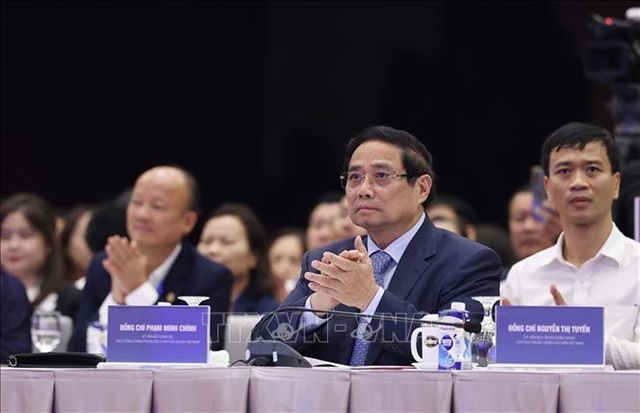 Economy
Economy
.jpg)
 |
| PM Phạm Minh Chính attends the plenary session of the Vietnam Private Economic Landscape Programme 2025 (ViPEL 2025) in Hà Nội on Friday. — VNA/VNS Photo |
HÀ NỘI — Prime Minister Phạm Minh Chính underscored the private sector’s role as a key driver of the socialist-oriented market economy during the plenary session of the Vietnam Private Economic Landscape Programme 2025 (ViPEL 2025) in Hà Nội on Friday.
Addressing the event, held ahead of Vietnam Entrepreneurs’ Day on October 13 and marking the 80th anniversary of President Ho Chi Minh’s letter to the business community, PM Chính highlighted the transformative impact of over 40 years of Đổi Mới (renewal). Agriculture, he noted, lifted Việt Nam from poverty to become a leading global rice exporter, while industry and foreign direct investment pushed the country past the lower middle-income threshold. He expressed optimism that sci-tech, innovation, and digital transformation would propel Việt Nam toward high-income status.
He called on private enterprises to pioneer in achieving Việt Nam’s two centennial development goals by aligning corporate strategies with national goals, joining patriotic movements through innovative, tech-driven products; and promoting equality, fairness, social progress and welfare to ensure no one is left behind.
They were also urged to grow holistically by harnessing internal strengths and surpassing limitations to become a leading force for growth, job creation, productivity, competitiveness, industrialisation, modernisation, and economic restructuring. Additionally, he advocated for extensive, substantive and effective global integration, enabling firms to compete on equal footing with global enterprises, advance in global value chains and adopt a long-term, ambitious development approach.
The session saw the launch of key initiatives, including the Vietnam Low Altitude Economy Alliance (LAE), the Vietnam Supporting Industries Manufacturers Alliance, and a 2025–2030 programme to enhance localisation and supporting industry capacity. A scheme was signed to adopt a pilot public-private nation-building model for 2025–2026, alongside a plan to honour outstanding entrepreneurs and enterprises.
Several cooperation agreements were exchanged, including a strategic partnership between HCM City and the Vietnam LAE Alliance, a deal between HCM City and Sovico Group for Metro Line 4, and another among Hà Nội, Sovico, and UNESCO to develop a “Creative Capital” model rooted in heritage and traditional values. Others included the “Made in Đà Nẵng” project and a Thái Nguyên project focusing on organic agriculture, heritage conservation, and cultural tourism linked to tea cultivation.
The event drew government officials, foreign diplomats, and over 500 representatives from international organisations, domestic and foreign business associations and enterprises.
ViPEL, one of the four tasks assigned by the Government to the Private Sector Development Research Board (Board IV) in coordination with the Ministry of Finance, aligns with the Politburo’s Resolution 68 to establish the private sector as a key economic driver.
The programme featured sectoral sessions, including a Vietnam Women Entrepreneurs’ Forum to underscore women’s contributions to private sector growth. Panel discussions addressed sector-specific challenges, identified growth opportunities, and proposed cooperation projects under the “Public-Private Nation-Building” framework.
The plenary session reviewed discussion outcomes and unveiled key initiatives, including the “Public-Private Nation-Building” model and the ViPEL mechanism. These focus on public-private synergies, linking Việt Nam’s value chains, promoting emerging technologies and innovation, advancing competitive industries, developing major infrastructure, and expanding resources and services through the ViPEL framework. — VNS